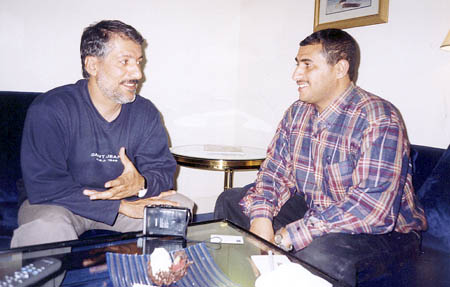Human Rights in Islam [Archives:2001/34/Law & Diplomacy]
Abdullah Lotfi Saif Abdulfatah
Ibb- Al-Udain
Since God is the Absolute and the same Master of men and the universe, He is the sovereign Lord, the Sustainer and Nourisher, the Merciful who enshrines all beings. Since he has given each man human dignity and honor and breathed into him of His own spirit, it follows that, united in Him and through Him, and apart from their other human attributes. Men are substantially the same and no tangible and actual distinction can be made among them, on account of their accidental differences such as nationality, color or race.
Every human being is thereby related to all others, and all become one community of brotherhood in their honorable and pleasant servitude to the most compassionate Lord of the universe. In such a heavenly atmosphere the Islamic confession of the oneness of God stands dominant and central and necessarily entails the concept of the oneness of humanity and the brotherhood of mankind.
Human blood is sacred in any case and cannot be spilled without justification. And if any violates this sanctity of human blood by killing a soul without justification, the Quran equates it to the killing of entire mankind:
Whose stay soul not to retaliate for a soul slain, nor for corruption done in the land, should be as if he had slain mankind altogether.
It is not permissible to oppress woman, children, old people, the sick or the wounded. Women’s honor and chastity are to be respected under all circumstances. The hungry people or person must be fed, the naked clothed and the wounded or diseased treated medically, irrespective of whether they belong to the Islamic community or from amongst its enemies.
Human rights in an Islamic state
1- The security of life and property:
In the address which the Prophet delivered on the occasion of the farewell Hajjy, he said: “your lives and properties are forbidden to one another till you meet your Lord on the day of Resurrection.” The Prophet also said about the dhimmis (the non-Muslim citizens of the Muslim state) one who kills a man under covenant (i.e. Dhimmi) will not even smell the fragrance of Paradise.
2- The protection of honor the Holy Quran lays down.
– You who believe, do not let one (set of people) make fun of another set.
– Do not defame one another.
– Do not insult by using nickname.
– Do not backbite or speak ill of one another. (49:12)
3- Sanctity and security of private life: The Quran has laid down the injunction.
-Do not spy on one another.
-Do not enter any house unless you are sure of the occupant’s consent.
4- The right to protest against tyranny: Amongst the rights that Islam has conferred on human beings is the rights to protest against government’s tyranny. Referring to it the Quran says “God does not love evil talk in public unless it is by someone who has been argued earlier, all power and authority belongs to God, and with men there is only delegated power which becomes a trust, every one who becomes a recipient or a done of such a power has to stand in awful reverence before his people towards whom and for whose sake he will be called upon to use these powers. This was acknowledged by Hazrat Abu Baker who said in his very first address “cooperate with me when I am right but correct me when I commit error; obey me so long a I follow the commandments of Allah and his prophet, but turn away form me when I deviate”.
——
[archive-e:34-v:2001-y:2001-d:2001-08-20-p:./2001/iss34/l&d.htm]


